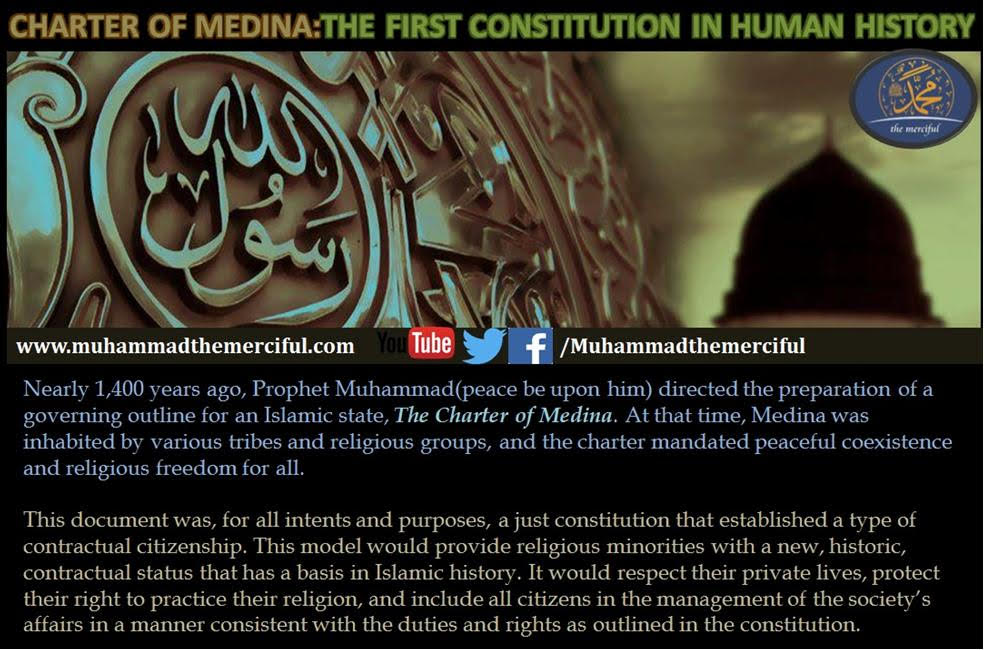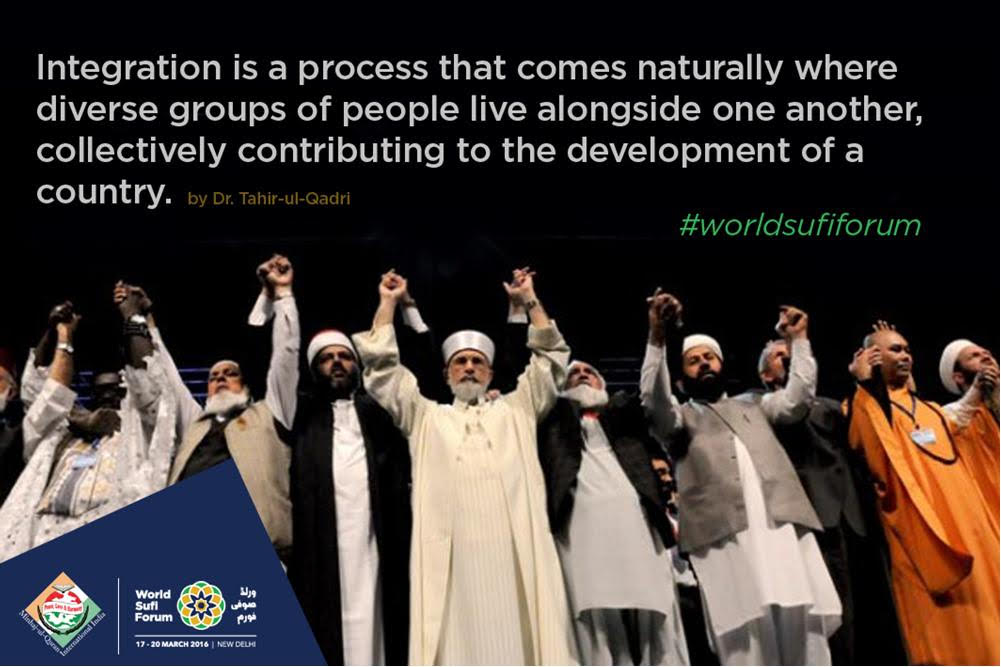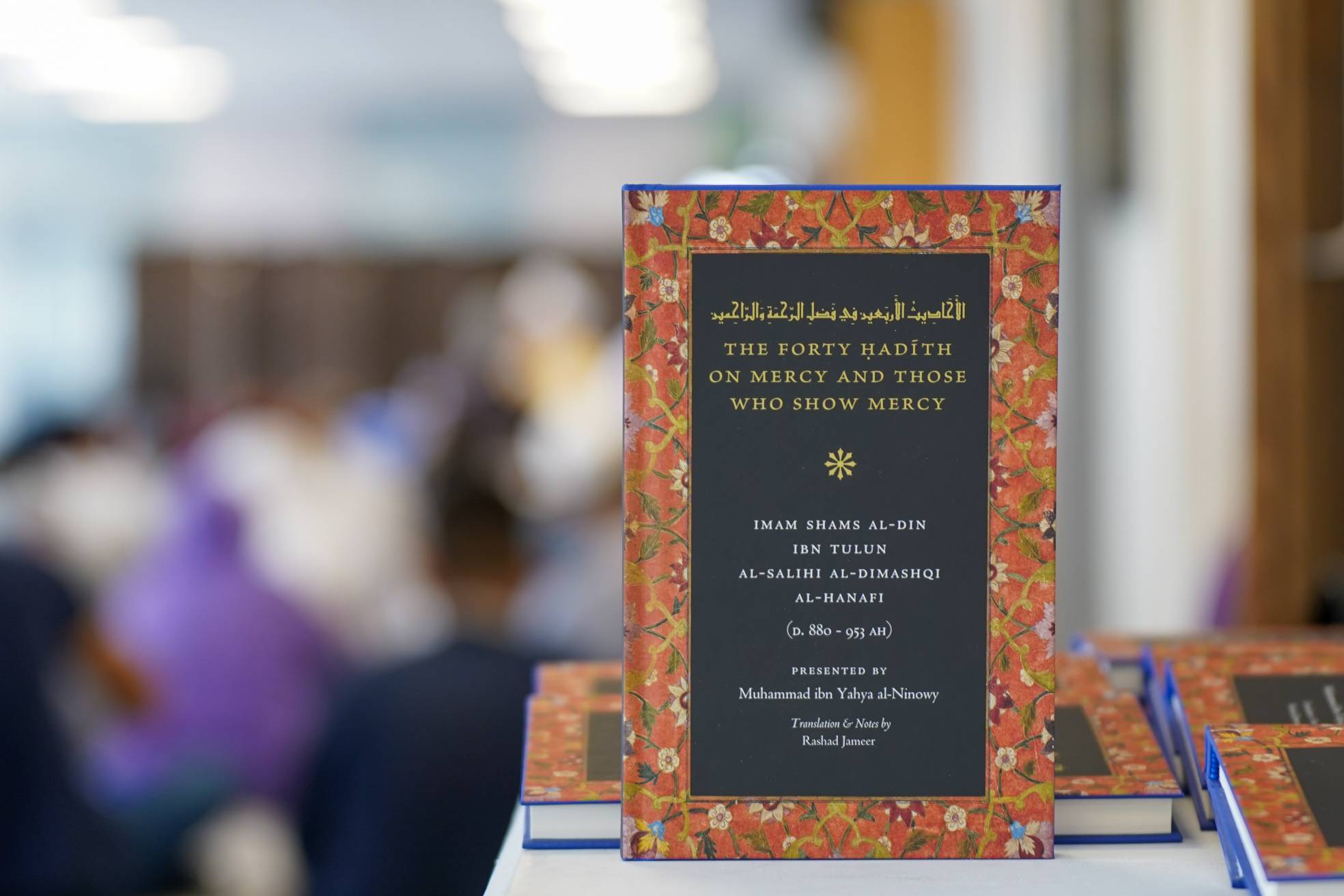Nearly 1,400 years ago, Prophet Muhammad (peace be upon him) directed the preparation of a governing outline for an Islamic state which was named “The Charter of Medina”. At that time, Medina was inhabited by various tribes and religious groups, and the charter mandated peaceful coexistence and religious freedom for all. This model would provide religious minorities with a new, historic, contractual status that has a basis in Islamic history. It would respect their private lives, protect their right to practice their religion, and include all citizens in the management of the society’s affairs in a manner consistent with the duties and rights as outlined in the constitution. Issues that were settled in the West no more than a hundred years ago were well documented in the constitution of Islam by the Holy Prophet(peace be upon him) fourteen centuries ago.
Article 1 of the Charter states:
{Related by Ibn Hisham in al-Sira Al-Nabawwiya,Vol.3,p.31;Ibn Kathir Al-Bidaya wa al-Nihaya Vol 2 p.260}
“This is a (constitutional) document from Muhammad the Prophet (and Messenger of Allah for the nations of the world)”
The subsequent article states,
{Related by Ibn Hisham in al-Sira Al-Nabawwiya,Vol.3,p.32;Ibn Kathir Al-Bidaya wa al-Nihaya Vol 2 p.260;al-Bayhaqi in Al-Sunan Al-Kubra Vol.8 p.106}
“This compact has been concluded between the believers & Muslims of Quraysh and Yathrib, and those who, in compliance, later, join their (political) alliance to fight the defensive war together.”
A complete structure of governance was established on the basis of this constitution. Governors were appointed and power was delegated at the provincial level ,forming a local government system for the first time in Medina. One must keep in mind that this was a time when the mere word of the ruler was the law. There was no sophisticated and methodology by which laws were deduced and instituted. Concepts such as consultative law, mutual assemblies and passing resolutions(prior to the enforcement of law) were all unheard of. These and many other political concepts were introduced to the Arabs and by extension to the world by the universal Prophet(peace be upon him).
The Medinan society ,established by Prophet Muhammad(peace be upon him) was built on the principle of Integration and was as such a categorical rejection of the models of Isolation & Annihilation, the former of which would have left his community cutoff from the rest of the world and the latter devoid of a definitive identity , unique to them.

Religious Freedom & Historic Condemnation of Terrorism
For the first time in history a constitution declared that Muslims must coexist with Non-Muslim tribes in the spirit of conviviality and mutual respect. The constitution of Medina didn’t sanction war against the Jews, Christians or any other Non-Muslim tribes. In fact the Non-Muslim tribes were under a covenant of protection and security, such that they were allowed to retain their local customs and religious practices, without facing antagonist reactions from the Muslims. Such actions initiated the development of a united Arabia under the banner of Islam. All this was possible as a direct result of the social and political reform instigated through the constitution of Medina.
Article 16 of the Charter states:
{Abu Ubayd al-Qasim b. al-Sallam,Kitab al-Amwal,p.194 $518}
“There will be collective resistance by the believers against any individual who rises in rebellion, attempts to acquire anything by force ,violates any pledge or attempts to spread mischief amongst the believers. Such collective resistance against the perpetrator shall occur even he is son of anyone of them.”
Hence any act of terrorism or violence under the constitution would amount to a crime and was accordingly punished. The charter not only guaranteed freedom to practice religion and prohibited acts of violence, it also placed responsibility on the citizens of Medina, be they Muslims or Non-Muslims, to collectively resist such acts.
Article 30 of the Charter states:
{Related by Ibn Hisham in al-Sira Al-Nabawwiya,Vol.3,p.34;Ibn Kathir Al-Bidaya wa al-Nihaya Vol 2 p.261}
“The Jews of Banu Awf are one community(political union) with the believers. The Jews have their religion and the Muslims and their associates have theirs, except those who behave unjustly and sinfully , for they hurt but themselves and their families.”
From article thirty to forty of the Charter:
The Holy Prophet(peace be upon him) mentioned each and every Jewish tribe by name, guaranteeing their right of protection under the new constitution.
The Qur’an also states freedom of religion in the verse : There is no compulsion in Din(Religion). (Qur’an 2:256)
Through the constitution, Holy Prophet(peace be upon him) postulated basic human rights thereby introducing the concept of religious freedom of minorities, and the protection of their culture and religion. Holy Prophet(peace be upon him) declared the state of Medina as a sanctuary of peace and security; no act of oppression , injustice or extremism would be allowed in the state of Medina.




